Dalmatians, Children and Babies
Dalmatians make great family pets. Like all dogs if care is taken in choosing a well bred Dalmatian puppy from parents with sound temperaments then a gentle, friendly spotty dog can make an excellent companion for even the youngest children.
Sadly, due to poor husbandry and puppy farmers, many dalmatians don’t get this ideal start. New owners don’t get the advice needed to train their puppy and to prepare their family and children for the introduction of a new dog. Many Dalmatians arrive in Welfare with issues relating to lack of training in their early years. However many of our Dalmatians of all ages have lived with children and in these cases we actively seek out families with children to place these dogs.
Adapting to a new family with children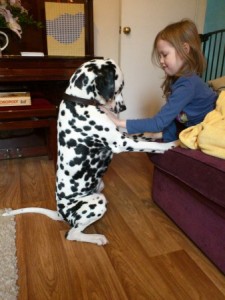
From our extensive experience of re-homing Dalmatians we have found that several things help the introduction and settling in of a Dalmatian to his or her new family.
New owners and parents should have reasonable expectations initially. The care, exercise and training of a dog is the responsibility of an adult, however involving children in feeding walking and training of a new dog can aid in forming a life long bond. It is the responsibility of parents to teach their children how to behave around a dog, remember small children are capable of cruel deeds and a new Dalmatian in a strange environment may react badly. So supervision of children when with a new dog is essential. Everyone wants to meet a Dalmatian particularly children so we recommend that you do not introduce your adopted dog to too many new faces too quickly.
Things to avoid with an adopted Dalmatian
Dalmatians are large active and boisterous dogs. Great care should be taken so that children do not get knocked down by a boisterous happy, waggy-tailed Dalmatian! As part of our adoption assessment process our experienced assessors will discuss the age, size and sex of a dog they feel would be suitable for you and your family. It maybe that we refuse to re-home a Dalmatian with a family with very young children who aren’t used to Dalmatians. Maybe in a few years time a suitable Dalmatian could be re-homed with your family when the children are little more robust. When we have matched your home and needs with one of our Dalmatians, begin to teach your children and their friends not to run up to a new dog. Explain that children should NEVER tease a dog however familiar the dog is with children, remember an adopted Dalmatian will not be familiar with your children. Never allow a small child to pick up and carry a puppy or young Dalmatian. Never allow a child to walk an adult dog without supervision. An adult Dalmatian can be very strong.
Good practice 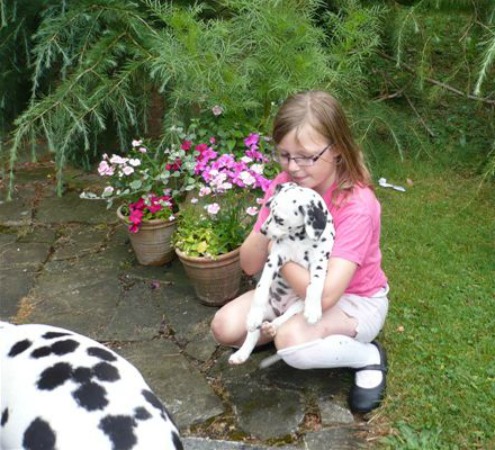
Ensure that all of your childrens’ friends are aware that you will be getting a new dog. It may be wise to talk to them and explain the rules of contact with the dog before they meet. Teach the dog to sit and wait for food, many breeds of dog are very food orientated and Dalmatians are no exception, nipped fingers from stealing food have led to us re-homing many dogs, remember it is the adults responsibility to teach children and dogs to be safe around food. Ensure that a dog is involved in day to day life even after the birth of a new child. (see babies below). Recognise a new dog as part of your family and realise that a lot of input and training are needed by both children and dog alike.
Many of us in Welfare and the British Dalmatian Club have lived with dogs since childhood and we are fully aware of the absolute joys of owning a dog as a child. Teaching your child to care and nurture a living thing and allowing them to take on the responsibility of day to day care of a dog is good for their physical and emotional development it will teach them responsibility patience and about love and loss.
New babies
One of the biggest reasons Dalmatians are re-homed is due to the imminent birth of a new baby or a dog not getting along with a new baby. Amongst the congratulations and all the activity, many parents-to-be neglect to prepare the family dog. This can be a mistake. Dogs are social by nature. They are pack animals and each pack has leaders and followers your dog is part of your family his or her “pack”. The humans lead, the dog follows. It’s that simple. We often anthropomorphise dogs but they are not human and think, act and communicate in quite different ways to humans. It is important that as responsible owners you are able to communicate with him or her and you are read his body language and non verbal cues. Your Dalmatian will need structure and guidance. This is paramount when a new addition to your pack is about to arrive.
Pre-Baby. Is your Dalmatian a model citizen?
Does your Dalmatian SIT, STAY or go DOWN when you tell him or her does he or she COME when called? If not you will need to polish up on your dogs training before your new bundle of joy arrives. It is a good idea to dress a doll and have the doll in the room maybe in a pram or playpen. Record friends’ babies crying, screaming and being noisy at play and play it back to your Dalmatian. Maybe enrol your Dalmatian in obedience classes and get to know your dog trainer they can be a great resource. Jumping up is a real problem and can be dangerous for a new baby in arms. Teach a dog to sit when people arrive use treats, Dalmatians think with their stomachs.
Is your dog spayed or neutered? If not, get it done, now. Neutered and spayed dogs make better family companions. Entire Dalmatians are often more possessive and overly protective. They are more likely to growl, snap, and even bite than their neutered/spayed counterparts. Un-neutered males have more of a sense of territory and will actively defend their pack from newcomers. Entire, young males can be bossy, pushy and wilfully disobedient they will push your boundaries. They can be easily distracted, making training more difficult. Un-spayed bitches go through hormonal changes at every heat cycle, causing them to become erratic and sometimes aggressive. Sexually intact Dalmatians experience sexual frustration; they can become destructive, attempt to escape, become very vocal, they will mount children, as well as adults. (This particular behaviour should be actively discouraged).
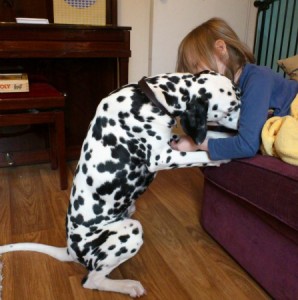
Is your Dalmatian possessive?
Does your Dalmatian guard things? He or She must learn that this is unacceptable behavior. You can tell the difference between “Pongo’s” toys and new baby toys but your baby will not be able to. Don’t risk small baby’s fingers, toes or life, train the dog. You, as his or her pack leader, must be able to take any item out of your dog’s mouth. If he or she bares his or her teeth, growls low or threatens you, call a professional trainer. The association of Pet Dog trainers APDT will be able to help you find a trainer local to you. While most Dalmatians can be retrained, you should not attempt to retrain a Dalmatian exhibiting theses possessive traits without professional advice.
Does your Dalmatian hunt Rabbits and stalk Birds? 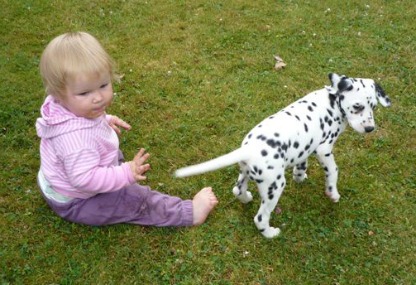
Be honest is your Dalmatian a hunter does he or she have an active prey drive? A newborn baby bares little resemblance to the adult humans your dog will be used to. They sound, smell, and move in odd ways. Dogs with strong predatory drives frequently view infants as something to chase! Don’t be lulled into a false sense of security, some pet dogs don’t express this drive while the child is very young its only when the baby starts crawling or toddling that this drive kicks in. The high-pitched noises and unpredictable movements of babies and toddlers can trigger predatory behavior, even though you may not have witnessed it before. Does your dog chase cars, bicyclists, joggers or hunt small game like squirrels and cats? Has your dog ever caught and/or killed small game? If he or she has, you need to consult a private trainer, preferably before the baby is born, in some cases, the dog may need to be re-homed.
Has your dog ever bitten anyone?
Don’t try to rationalise this. Dog bites can be offensive (attack) or defensive (protective from fear). Did the dog’s teeth make skin contact? If the answer to these questions is yes your Dog has bitten. Has your dog snapped at passers-by or guests? A snap is a warning, or a bite that didn’t connect (due to your quick reflexes?). A Dalmatian that demonstrates this type of behavior must be evaluated immediately; involve a professional trainer, now. Again in certain cases Dalmatians that have bitten may need to be re-homed. Re-homing a Dalmatian or any dog that has a history of biting can be very difficult,
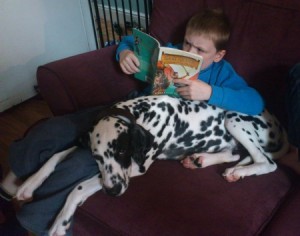
Wah Wah Wah!!! The baby has arrived.
Before you bring the baby home, from hospital bring home a blanket or a towel that the baby used or slept on. Do not wash them. Leave them around the home let your Dalmatian sniff them. Let him or her become familiar with the new baby smell. Encourage him or her as he or she curiously investigate the scent. Be positive, heap on the praise – “That’s the new baby!! He’s coming home tomorrow. Your just going to love her! What a good boy What a good girl!!”
Meeting Baby: The introduction
Mom, should greet the Dalmatian without the baby . Give him or her a big hug and loud greeting. Let the dog smell you all over; he or she will pick up the baby’s scent on your clothing. Watch him or her closely. After the initial excited greeting has calmed down have one person hold the baby. Your Dalmatian’s “Pack leader” should have the dog on a lead. Sit the dog and praise him. The dog should close enough to see, but not touch, the baby. Short frequent introductions like this during the first day are recommended. Gradually allow your Dalmatian closer, carefully observing his or her responses. If he or she is under verbal control and calm after several of these “introductions”, try it without the lead. Now its time to allow the dog to wander loose in the room while the baby is being held, feel free to pet the dog while you hold the baby and don’t forget heap on the praise!

Your Dalmatian and your Baby…Life together :
Never, ever leave your baby or indeed a child unsupervised with your dog. No matter how well you think you know your Dalmatian, accidents happen. Newborn babies are far more fragile than newborn puppies; even with the most maternal of instincts, your Dalmatian can accidentally injure or even kill your baby. Some pet dogs’ predatory drives are not apparent, and the sounds, smells and movements of infants and children trigger many dogs. Dogs are often unaware of their own strength, and can cause injury out of excitement and happiness. Do not take risks. NEVER leave your child alone with the dog!
Still make time every day to have ‘fun’ with your Dalmatian without the baby present. Play-training sessions, throwing his or her favorite toy, hide and seek on a long walk is good let the other half have the baby for an hour or so! Never play any of the following games: tug of war, wrestling, or games involving chasing people or any other living being. While they may seem innocent to you, thease type of games all tell the dog in his language that he’s in charge he is dominant. Canine friendships are loyal and true if you realise that dogs can’t understand the concept of equality. In the Dog world there are leaders and followers, YOU must be your dog’s leader.
Take time daily to have fun with the dog with the baby present! Get the pushchair out take some dog treats and toys and get outdoors, your dog will love it and its is good for you and your new child.
Some of this may sound very worrying particularly for new parents. However most dalmatians make ideal companions for children even those who are quite small. Their pleasure in human company means they will revel in a child’s attention and of course they will listen without answering back!
There are a couple of excellent books if you would like to do some further reading and the British Dalmatian Club and the North of England Dalmatian Club have more information on introducing a Dalmatian to children and babies.
Your Dog and Your Baby: A Practical Guide
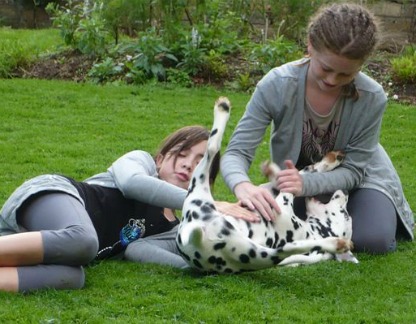
Silvia Kent and John Fischer
£12.95 Amazon.co.uk
Childproofing Your Dog: A Complete Guide to Preparing Your Dog for the Children in Your Life
Brian Kilcommons and Sarah Wilson
Is only available from the USA. Amazon will ship it to UK.
